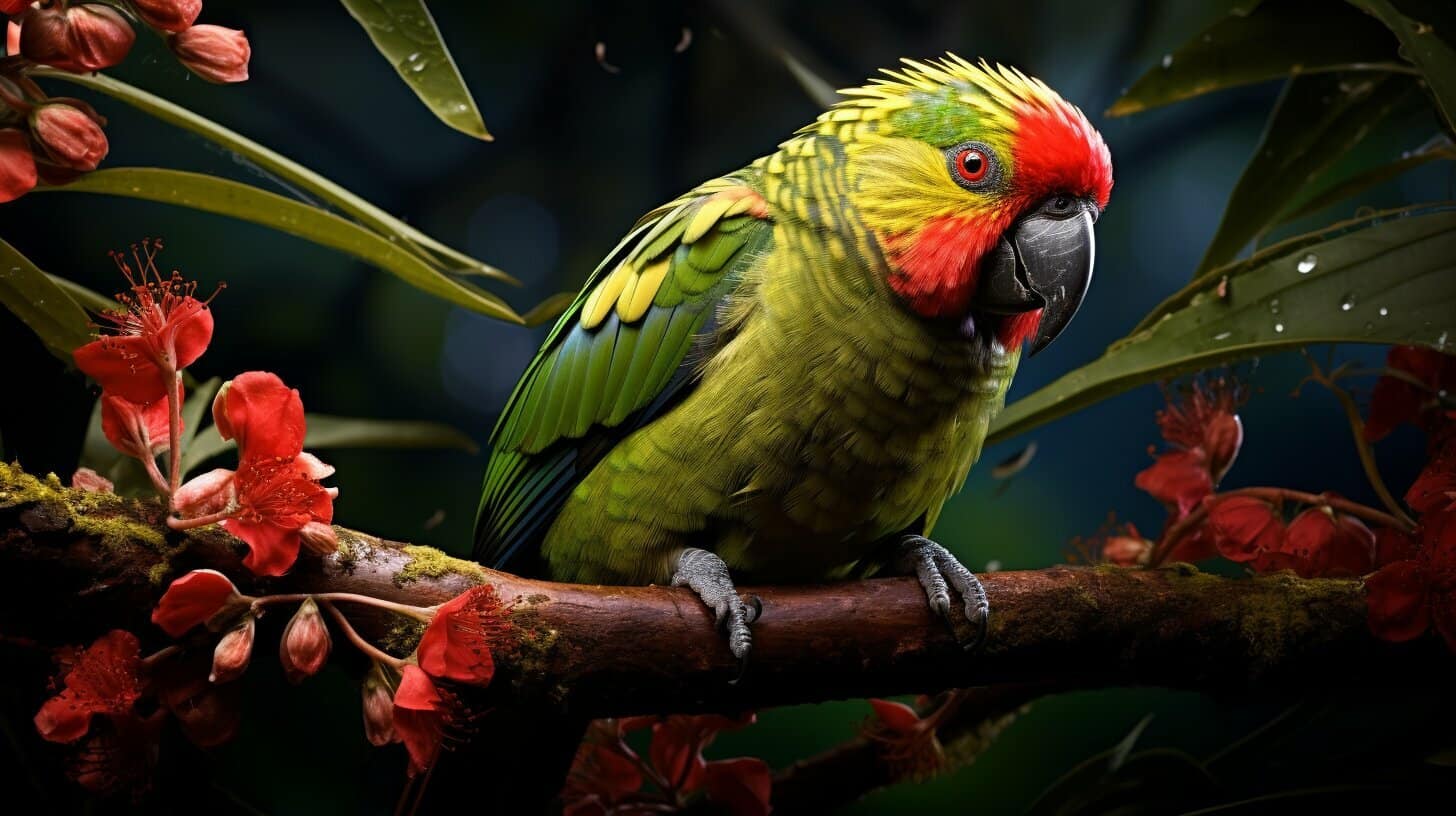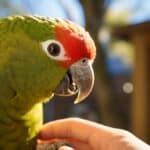Kakarikis are lively and intelligent parakeets that make wonderful pets. As with any pet, it’s essential to understand their lifespan to provide the best possible care and ensure a long and healthy life. In this article, we’ll explore the lifespan of Kakarikis, factors that can impact their longevity, and tips for enhancing their lifespan.
What is the Lifespan of a Kakariki? A Kakariki has an average lifespan of 6-10 years in the wild and up to 15 years in captivity. Despite their striking appearance, they require consistent care and a balanced diet to reach their potential lifespan. They’re social birds, often thriving best in pairs or small groups. Like all parrots, a stimulating environment with toys and regular interaction is key to their well-being.
Key Takeaways:
- Kakarikis have an average lifespan of 6-10 years in the wild and up to 15 years in captivity.
- Diet, environment, genetics, and healthcare are significant factors that affect the lifespan of Kakarikis.
- Providing proper care, including a balanced diet, exercise, socialization, and regular veterinary check-ups, can enhance the lifespan of Kakarikis.
Understanding the Average Lifespan of Kakarikis
Kakarikis, like all living creatures, have a limited lifespan. Understanding their average age range can help owners provide optimal care to ensure longevity. In the wild, the average lifespan of a Kakariki is around seven years due to various potential threats, including predation, disease, and habitat loss. However, with proper care and attention in captivity, Kakarikis can live for up to 15 years or more.
Many factors can influence the lifespan of a Kakariki. One of the most significant is diet. A balanced and nutritious diet is crucial for maintaining good health and preventing various health issues affecting lifespan. Kakarikis thrive on a diet that includes a variety of fresh fruits and vegetables, as well as high-quality parrot pellets and seeds. Avoid feeding them foods high in fat, salt, or sugar, as these can harm their health.
Another factor that can impact the lifespan of Kakarikis is their environment. They require plenty of space to move around and exercise and access to fresh air and natural light. Avoid overcrowding cages or placing them in areas with temperature extremes or high levels of noise or pollution. Ensuring their safe and comfortable living space is essential for their well-being and longevity.
Factors Affecting the Lifespan of Kakarikis
Other factors that can affect the lifespan of a Kakariki include genetics and healthcare. Some Kakarikis may be predisposed to certain health conditions due to their genetics, which can impact their longevity. Regular check-ups with a qualified avian veterinarian can help ensure potential health issues are caught early and treated promptly.
Providing proper healthcare for Kakarikis also involves regular grooming and hygiene. For example, keeping their feathers clean and tidy can prevent feather plucking and related issues that can impact lifespan. Additionally, providing mental stimulation and regular exercise can help keep them engaged and active, promoting good health and well-being.
In summary, understanding the average lifespan of Kakarikis is essential for providing optimal care that can enhance their longevity. This includes providing a balanced and nutritious diet, a safe and comfortable living environment, and regular healthcare check-ups. By taking these steps, owners can help ensure their beloved Kakarikis live happy, healthy, and fulfilling lives for many years.
Factors Affecting the Lifespan of Kakarikis
Kakarikis, like all living creatures, have a limited lifespan. While their average lifespan ranges from 6 to 12 years, many factors can affect their longevity. By understanding these factors, Kakariki owners can take steps to promote a longer and healthier life for their beloved parakeets.
Nutrition
One of the primary factors that can impact a kakariki’s lifespan is their diet. A poor diet can lead to malnutrition, weaken the bird’s immune system, and make them more susceptible to disease. Ensuring that Kakarikis receive a balanced diet consisting of fresh fruits, vegetables, and high-quality pellets or seed mixes is important.
Offering a variety of foods can also help provide the necessary nutrients and prevent boredom. Avoid feeding your Kakariki avocado, chocolate, caffeine, and alcohol, as these can be toxic to birds.
Environment
The environment in which a kakariki lives can also influence its lifespan. Kakarikis thrive in spacious and stimulating environments that provide exercise, socialization, and mental stimulation opportunities. A roomy cage or aviary with plenty of perches, toys, and hiding spots can help keep your Kakariki healthy and happy.
It is also essential to maintain a clean living space for your Kakariki. A dirty environment can lead to respiratory and other health problems.
Genetics
Some Kakarikis may have a genetic predisposition to certain conditions that can affect their lifespan. Breeders can help reduce the risk of inherited health problems by selecting healthy birds for breeding and avoiding inbreeding.
Healthcare
Regular veterinary check-ups can help detect and prevent health problems before they become serious. Kakariki owners should also pay attention to changes in their bird’s behaviour or appearance and seek veterinary care promptly.
Proper medical care, including vaccinations and parasite prevention, can also help protect the bird’s health and enhance its lifespan.
By providing appropriate nutrition, a stimulating environment, and regular veterinary care, Kakariki owners can help ensure that their birds live long and healthy life.
Providing Proper Care for Kakarikis
Kakarikis are intelligent and active parakeets requiring proper care to live long and healthy lives. The following tips can help ensure your Kakariki remains healthy and happy:
Diet
Offer your Kakariki a balanced diet that includes a variety of fresh fruits, vegetables, seeds, and pellets. Avoid offering foods high in fat, sugar, or salt. Make sure your Kakariki always has access to fresh, clean water.
Housing
Provide your Kakariki with a spacious enclosure for plenty of flight and exercise. The enclosure should be made of safe, non-toxic materials and cleaned regularly to maintain a healthy environment. Include a variety of perches, toys, and climbing structures to keep your Kakariki mentally stimulated.
Exercise
Kakarikis are active parakeets that require daily exercise to stay healthy. Allow your Kakariki to fly outside of their enclosure in a safe and enclosed area, and encourage them to climb, play, and explore. Provide opportunities for your Kakariki to exercise inside their enclosure, such as by placing toys at different heights and using a variety of perches.
Socialization
Kakarikis are social birds that thrive on interaction with their owners and other birds. Spend time with your Kakariki daily, talking to them, offering treats, and playing games. If possible, consider getting a second Kakariki to provide your bird with a companion.
Veterinary Care
Regular veterinary check-ups are essential to maintaining your Kakariki’s health. Find a veterinarian knowledgeable about birds and take your Kakariki in for regular check-ups, even if they appear healthy. Be alert to any changes in your Kakariki’s behaviour or appearance, as these can be signs of illness.
Providing your Kakariki with proper care and attention can help ensure they live a long, healthy, and happy life.
Common Health Issues in Kakarikis
Kakarikis are generally hardy and healthy birds, but like any living creature, they are susceptible to certain health issues. Awareness of these common ailments and their symptoms can help you provide suitable care and treatment for your feathered friend.
Respiratory infections
Respiratory infections are one of the most common health issues in Kakarikis. Symptoms of this ailment include sneezing, coughing, wheezing, and mucus in the nasal passages. If you notice any of these signs, seek veterinary care immediately. Respiratory infections can be fatal if left untreated.
Nutritional deficiencies
Malnutrition can lead to a variety of health problems in Kakarikis. Symptoms of nutritional deficiencies include feather loss, deformed beak, and weakness. Ensure your bird has a balanced and varied diet, including fresh fruits, vegetables, and seeds.
Feather plucking
Feather plucking is a behavioural issue resulting from stress, boredom, or poor nutrition. If your Kakariki is seen excessively plucking its feathers, it is crucial to determine the underlying cause and address it immediately. Feather plucking can lead to infections, feather loss, and even death.
Regular veterinary check-ups, a well-balanced diet, and a clean and stimulating environment can help prevent these and other common health issues in Kakarikis. If you suspect your bird is unwell, seek veterinary care immediately. Your Kakariki can thrive and live a happy and healthy life with proper care and attention.
Enhancing the Lifespan of Kakarikis
A balanced diet is essential to enhancing the lifespan of your Kakariki parrot. These birds require diverse foods, including fresh fruits, vegetables, seeds, and nuts. Avoid feeding them processed or high-fat foods, leading to obesity and other health issues. Offering a variety of foods can also help prevent boredom and encourage mental stimulation.
Regular exercise is also crucial to promoting a longer lifespan for your Kakariki. These active birds love to fly and explore their environments, so providing plenty of space and stimulating toys can help keep them physically and mentally fit. Encouraging them to exercise regularly can also help reduce the risk of obesity and other health problems.
Mental stimulation is important for Kakarikis, too, as they are intelligent birds that thrive on social interaction and mental challenges. Offer them toys and puzzles that encourage problem-solving and reward-based activities. Regular socialization with their owners and other birds can also help keep them engaged and stimulated.
Regular veterinary check-ups are essential to maintaining the health of your Kakariki and detecting any potential health concerns early on. Taking your bird for a check-up at least once a year is recommended, and more frequently if you notice any changes in behaviour or appetite. A healthy bird is more likely to live longer, so providing proper healthcare is crucial.
Lastly, closely monitor your Kakariki’s well-being, appearance, behaviour, and eating habits. Addressing any potential health concerns promptly can help prevent them from becoming more serious and impacting your bird’s lifespan.
Conclusion
Providing proper care and attention to your Kakariki can significantly enhance their lifespan. Understanding the factors impacting their well-being and taking appropriate measures can ensure that your parakeet remains healthy and active for years.
In summary, the average lifespan of a Kakariki is around 7-12 years, with some living up to 20 years in captivity. Factors such as diet, environment, genetics, and healthcare can influence their longevity, so creating a healthy and stimulating environment that promotes their well-being is essential.
Some essential tips for improving the lifespan of your Kakariki include offering a balanced diet, regular exercise, and mental stimulation. Additionally, providing your parakeet with a spacious and comfortable living environment, socialization opportunities, and regular veterinary check-ups can help address potential health concerns and promote longevity.
While Kakarikis may face some common health issues, early detection and proper treatment can significantly improve their chances of living long and healthy lives. Being attentive to your Kakariki’s overall well-being and quickly addressing any potential concerns can help ensure your feathered friend’s happy and fulfilling life.
In conclusion, owning a Kakariki can be a rewarding experience, and seeing your parakeet live a long and healthy life is undoubtedly a source of joy. Implementing the care tips and suggestions outlined in this article can help your Kakariki live their best life possible.
FAQ
Q: What is the lifespan of a Kakariki? Discover Their Age Range.
A: The average lifespan of a Kakariki is around 10 to 15 years. However, they can live beyond 20 years with proper care and attention.
Q: Understanding the Average Lifespan of Kakarikis
A: Kakarikis have an average lifespan of 10 to 15 years in the wild. In captivity, where they receive consistent care and a balanced diet, they can live even longer, reaching up to 20 years or more.
Q: Factors Affecting the Lifespan of Kakarikis
A: Several factors can influence the lifespan of Kakarikis. Diet plays a crucial role, with a nutritious and varied diet contributing to their longevity. Their environment, including the size and quality of their cage, also affects their lifespan. Genetics and healthcare are also important factors, with regular veterinary check-ups and prompt attention to any health issues helping to extend their lifespan.
Q: Providing Proper Care for Kakarikis
A: To ensure a long and healthy life for your Kakarikis, it is essential to provide them with a balanced diet consisting of fresh fruits, vegetables, and high-quality pellets. They also require a spacious cage with plenty of exercise and mental stimulation opportunities. Socialization and regular veterinary check-ups are vital for their overall well-being and longevity.
Q: Common Health Issues in Kakarikis
A: Kakarikis may be prone to respiratory infections, nutritional deficiencies, and feather plucking. Early detection and appropriate treatment are crucial in maintaining their health and extending their lifespan. Regular veterinary check-ups and a clean, well-maintained living environment are essential preventive measures.
Q: Enhancing the Lifespan of Kakarikis
A: To enhance the lifespan of Kakarikis, providing mental stimulation through toys, regular exercise through flight or playtime, and a balanced diet with proper nutritional needs are essential. Monitoring their well-being and promptly addressing health concerns will contribute to their longevity.



Have comments or questions about this article? Then get involved!
Spotted an error or something we have missed? Let us know